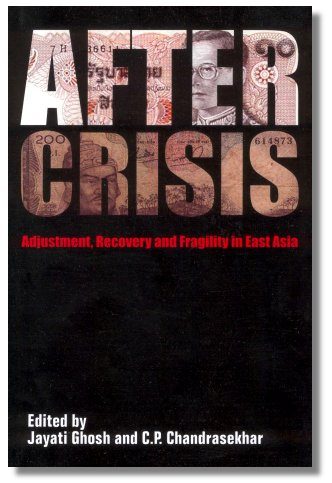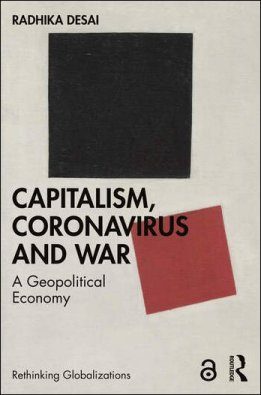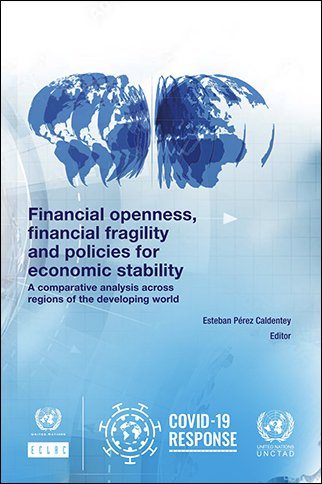Publisher: Third World Network Year: 2023 No. of pages: 42 Download now About the Book…
After Crisis – Adjustment, Recovery and Fragility in East Asia Edited by Jayati Ghosh and C.P. Chandrasekhar

Publisher: Tulika Books
ISBN: 978-81-89487-58-4
About the Book
The global financial crisis that exploded around September 2008 was just one more in a series of crises that have affected more than sixty countries in the era of financial liberalization. Of course the latest crisis is particularly significant in a number of ways: it originated in the core of capitalism, in the United States; it has spread dramatically across the world, even to countries that earlier seemed to be relatively secure; it calls into question many of the mainstream economic dogmas that have dominated economic policy-making for more than two decades. Yet, in some other ways, the current crisis is not very different from those that have preceded it in the recent past.
July 2007 marked the completion of a decade since the onset of financial crisis in several East and Southeast Asian countries. The crisis of 1997 focused attention on the dangers associated with a world dominated by fluid finance. It brought home the fact that financial liberalization can result in crises even in so-called ‘miracle economies’. Prior to the crisis, the pace and pattern of growth in many countries in that region were challenging the dominance of the original capitalist powers over the global economy. The 1997 crisis set back that process, and even after a decade many of these countries have not been able to recover their pre-crisis dynamism.
In hindsight, it is clear that currency and financial crises have devastating effects on the real economy. The ensuing liquidity crunch and wave of bankruptcies result in severe deflation, with attendant consequences for employment and the standard of living. The adoption, post-crisis, of conventional IMF stabilization strategies tends to worsen the situation: governments continue to adopt very restrictive macroeconomic policies and restrain public expenditure even in crucial social sectors. Finally, asset price deflation and devaluation pave the way for foreign capital inflows that finance a transfer of ownership of assets from domestic to foreign investors, thereby enabling a conquest by international capital of important domestic assets and resources.
This book delineates the alternative trajectories of post-crisis development in different economies, the lessons they offer and the implications they have for alternative policies. It is important to take stock of these processes because it is becoming evident that the international financial system has still not evolved effective ways of preventing such crises among emerging economies and of reducing their damaging effects. This book therefore has a wider focus than the East Asian ‘crisis economies’ alone: it tries to situate post-crisis developments in a broader analysis of the recent political economy of international capitalism, in particular, the role of mobile finance. It also offers comparative perspectives on post-crisis restructuring in other developing countries that have experienced crisis; as well as on the experience of other Asian countries that were affected by, but did not experience the financial crisis. While the essays in this book were originally written in 2007, they remain extraordinarily relevant to the present times, not least because they anticipate the processes that led to the global financial meltdown in 2008. Many of them predict the severe impact the current global crisis is having on both financial variables and the real economy, in developing countries in particular.
Contents
Contributors
Introduction Jayati Ghosh & C.P. Chandrasekhar
The Changing contours of Financial Crises in Developing Countries
Financial Crises, Reserve Accumulation and Capital Flows
Continuity of Change?: Finance Capital in Developing Countries a Decade after the Asian Crisis
Crisis and Its Aftermath in East and Southeast Asia
Adjustment, Recovery and Growth after Financial Crisis: A Consideration of Five ‘Crisis’ Countries of East and Southeast Asia
Unchained Melody: Economic Performance after the Asian Crisis
Thai Capital after the Asian Crisis
Ten Years after the Crisis: A bright Future for Capitalism in Thailand?
Monetarist and Neoliberal Solutions in Indonesia: Old Wine in New Bottles?
The Role of Foreign Capital in the South Korean Financial Crisis and Recovery
The End of Developmental Citizenship?: Economic Restructuring and Social Displacement in Post-Crisis South Korea
Financial Liberalization, Crises and the Role of Capital Controls: The Malaysian Case
The Philippines Ten Years after the Asian Crisis
Economic Performance after Financial Crisis in Other Emerging Markets
Latin American Financial Crises and Recovery
Patterns of Adjustment under the Age of Finance: The Case of Turkey as a Peripheral Agent of Neoliberal Globalization
Recovery and Adjustment after the 1998 Russian Currency Crisis
Other Asian Experiences
China and Post-Crisis Globalization: Towards a New Developmentalism?
Vietnam and the Experience of the Asian Crisis
Index
About the Authors
Jayati Ghosh and C.P. Chandrasekhar, the editors of this volume, are both Professors at the Centre for Economic Studies and Planning, School of Social Sciences, Jawaharlal Nehru University, New Delhi, India.
To order copies of the book, please contact:
Tulika Books, 35 A/1 (Third Floor) Shahpur Jat, New Delhi 110 049, India.
email: tulikadelhi@gmail.com
IPDA, 35 A/1 (Ground Floor), Shahpur Jat, New Delhi 110 049, India.
email: ipd.alternatives@gmail.com
To buy copies of the book online
please visit: www.scholarswithoutborders.in, www.ipda.in



